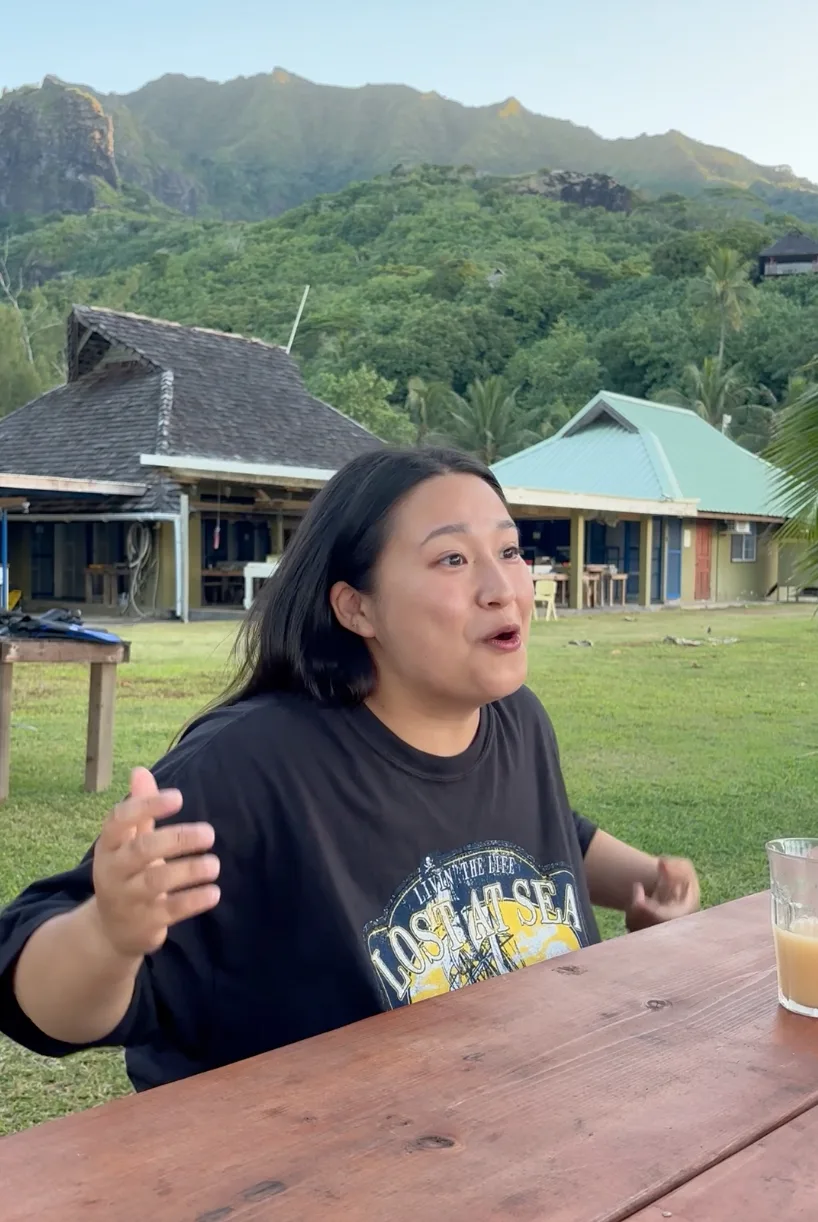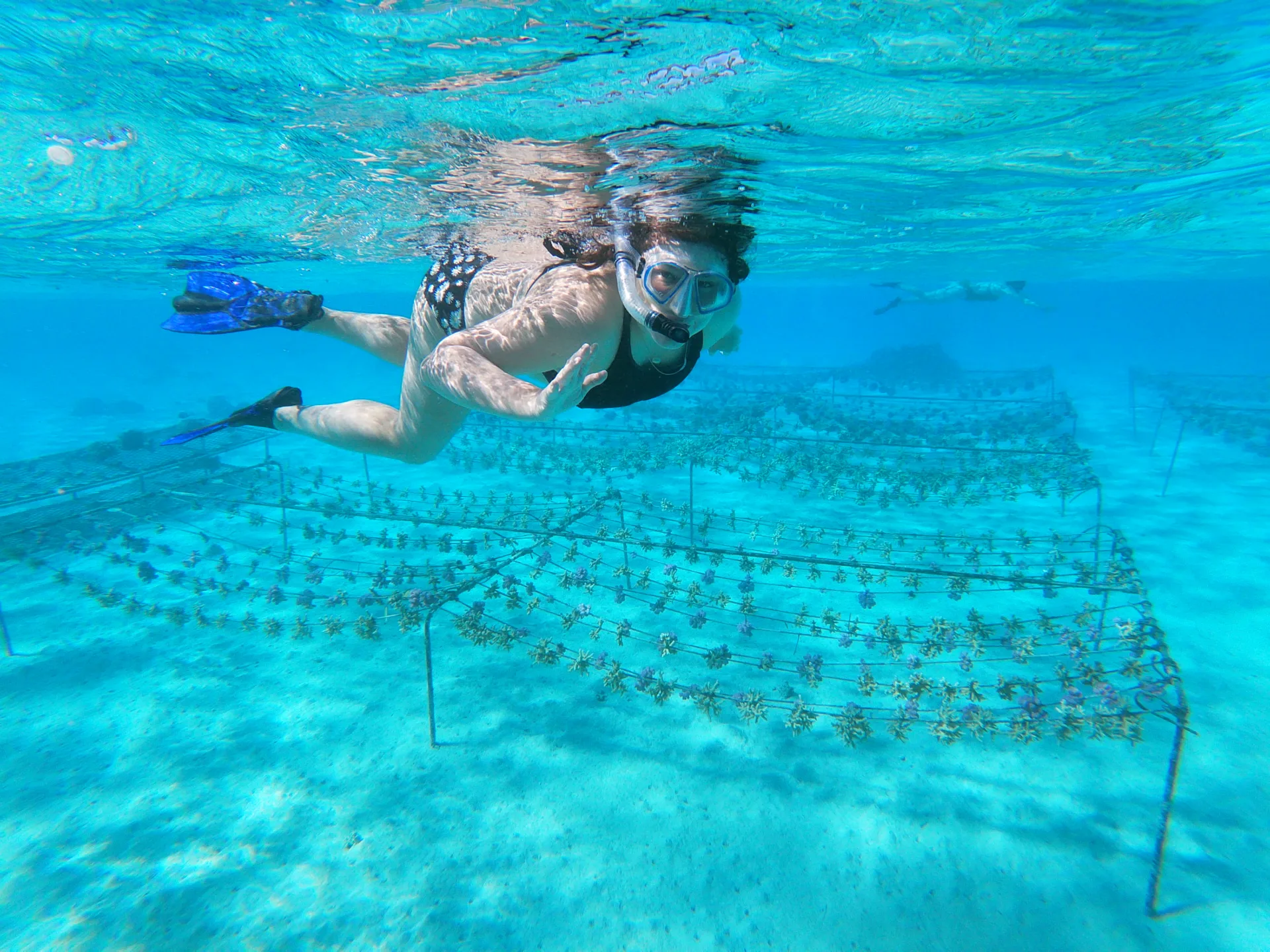Programs Blog
Patricia On Coral Gardeners and The Girl Who Cried Whale

Date: May 27, 2025
Time: 0945
Location: Gump Marine Station, Mo’orea
Weather: 81˚ F, 8 kts easterly
Below is an excerpt of an interview with Patricia Diaz-Bian, Cornell University
Will you talk about our visit with Coral Gardeners?
It was so great. From the dock of Gump we went on a boat across the bay to their headquarters where we got a 20-minutish talk about the work that they do—not just here what it was founded, but in Fiji and others around, too. We got the whole history of it. The founder was only 19 when he started his first project with the corals. It was pretty inspiring.
After that we went by boat to one of their nurseries. They got us scrubbing away at some of the rope (on their out-planting stands, to clean off the algae), and that was pretty fun! It was crazy the diversity of fish and marine life around this coral area, compared to the other snorkeling spots like on Bora Bora, which was, like, beautiful, we saw a lot, but you could clearly tell at this small nursery at the Coral Gardeners site that this is both giving a home to the fish and rebuilding that ecosystem. Really cool.
I love fish! I was really into aquariums as a kid. I also saw this one fish, not a parrot fish, really colorful. There’s this meme on the internet where there’s this fish, and it kind of looks dumbly at the camera with its teeth sticking out with the big lips. And I saw this fish and it turned to me and it made the exact same face. I almost drowned then because I sucked in so much water laughing!
How did the visit impact your thinking about coral restoration?
I’ve always known about the coral reef being in trouble. Just a general public’s knowledge. I’m not in the oceanography field. I knew about polyps. I knew about the biology. Because I watch a lot of Nat Geo, and sometimes that pops up on my feed. We hear a lot about the coral bleaching, but it’s nice to know about local restoration efforts. We’ve talked about this, but a lot of the way that climate change effects are being projected, or explained to the people, the masses, that–Oh, this is a big systemic thing, there’s too much carbon dioxide in the air—and also that the common person is not the one making most of these emissions. So most people have a feeling of like, Okay, I can do my part, but are the people that really matter going to do their part? So it’s really nice to see how these local efforts are really successful. It gives hope.
Will you tell us a sea story?
I have many! But definitely seeing that whale. I was the one that spotted it. And nobody believed me. Because I had just got up to lookout and was doing my little survey and I see this spout of water. I’m like, That’s not what an ocean spray is. I turn and there’s this huge whale, maybe two hundred feet off our starboard side, just parallel to us, and its back came out of the water. I screamed “Whale!” But then I realized you’re not supposed to scream on the boat. So I unclipped and then ran back to the quarterdeck and said, “Whale, whale, look that way!” Nobody looked that way. Everybody was like, Yeah, you saw a whale. Sure, good for you. It just disappeared? A big whale? Right there?
I even went into the lab, to science, and said, “I just saw a whale. Note that down. Right now.” But they looked at me like, Hmmm, sure you saw a whale. Is it there? And I was like, “No.”
So I go back to my lookout and not even a minute back on lookout I turn around again and there the fricking whale is! It hadn’t breached the surface yet, but you know like the big shadows in the water, when you know something is there? That has to be the whale! I think, I’m going to make sure everyone sees the whale this time. I unclip and walk aft. I’m loudly saying “Whale! Whale!” I almost became the boy who cried wolf. Nobody was looking again. They were all looking at me. I said, “The whale is right behind you!”
I remember vividly. This is how it is in my brain. Andrew is walking toward me at midships, and he can’t hear me or isn’t listening, and he won’t look behind him. “Look behind you!” All of a sudden the sky turned black with the shadow of this whale who just breached again behind him. It just engulfs my vision. He’s still not looking at! Nobody’s looking at! I’m shouting “Aft! Back!” Any synonym to get people to look in that direction. Finally, I think Zach gets some sense, and he turns his head and catches the end of that breach, and shouts “Whale!” And then people believed me.
This was one of the first times in weeks we had the entire ship’s company on deck at the same time. The whale stayed with us for quite a while. Ana said it stuck its eye out. It was definitely watching us.


Recent Posts from the Ships
- Ocean Classroom 2024-A collaborative high school program with Proctor Academy
- Collaborations and Long-term Commitments: SEA’s Caribbean Reef Program Sets a Course for Coastal Programs that Compliment Shipboard Experiences.
- Sea Education Association students prepare for life underway using state of the art nautical simulation from Wartsila Corporation.
- SEA Writer 2022, Magazines From the Summer SEA Quest Students
- Technology@SEA: Upgrades Allow Insight into Ocean Depths
Programs
- Gap Year
- Ocean Exploration
- High School
- Science at SEA
- SEA Expedition
- SEAScape
- Pre-College
- Proctor Ocean Classroom
- Protecting the Phoenix Islands
- SPICE
- Stanford@SEA
- Undergraduate
- Climate and Society
- Climate Change and Coastal Resilience
- Coral Reef Conservation
- Marine Biodiversity and Conservation
- MBL
- Ocean Exploration: Plastics
- Ocean Policy: Marine Protected Areas
- Oceans and Climate
- Pacific Reef Expedition
- The Global Ocean: Hawai'i
- The Global Ocean: New Zealand